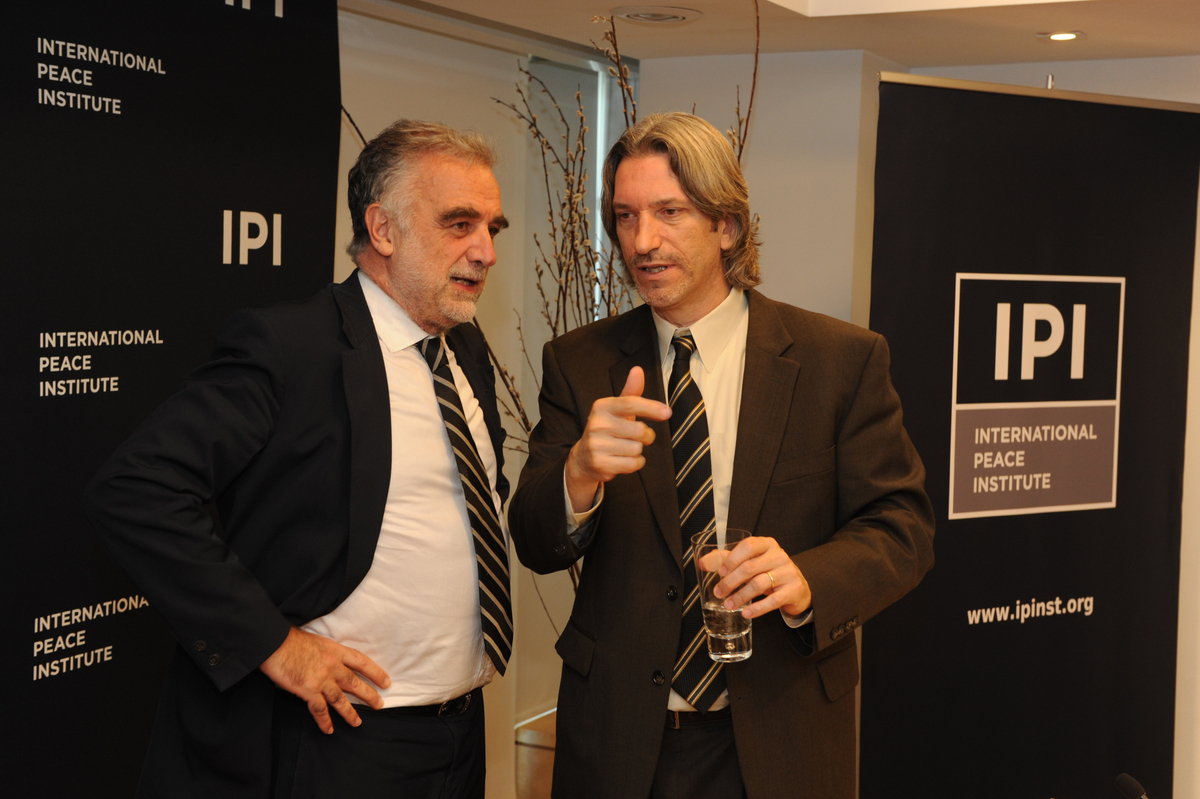
As International Criminal Court Chief Prosecutor Luis Moreno-Ocampo’s tenure comes to an end in June and on the heels of developments in high-profile cases testing international justice mechanisms, it’s an opportune time to reflect on the ICC’s first decade. At a recent event hosted by the International Peace Institute in New York, it was a unique occasion that Moreno-Ocampo led the discussion of lessons learned and challenges that lie ahead.
The event focused on a fundamental impediment to the ICC’s work: the court’s inability to execute arrest warrants. Zénon Mukongo Ngay, minister counselor from Democratic Republic of Congo’s U.N. Mission, and Enough Project Co-founder John Prendergast participated in the discussion as panelists.
In his remarks, Moreno-Ocampo stressed that the challenge in moving forward with cases in the ICC’s docket lies in the discrepancy between “consensus” in principle and in practice. “We have an agreement to end impunity and to [adhere to] the Rome treaty, so we have consensus on the principle, but there is not yet the consensus required on implementation,” he said, citing three outstanding arrest warrants for current Sudanese leaders, President Bashir, Defense Minister Abdelrahim Mohamed Hussein, and Southern Kordofan Governor Ahmed Haroun—all wanted for crimes allegedly committed in Darfur. As a way to illustrate why it is so difficult to gain consensus on the cases, he described the theoretical thought process of some critics of the Bashir arrest warrant, who say “Yes, we agree what you’re saying is a good idea, but not today in Darfur. We’re worried about the South of Sudan. We’ll ignore the Bashir genocide in Darfur.”
Prendergast highlighted this same discrepancy between progress on international justice in theory and practice, calling political will the “key variable and wild card” that has a major impact on the apprehension strategy for each case. In his presentation, Prendergast addressed the primary political interests undermining efforts to arrest the ICC’s three most-wanted men:
Sudanese President Omar al-Bashir: Bashir is protectively situated in a powerful clique at the top of Sudan’s ruling party that has overseen a huge increase in oil production financed by Chinese, Indian, and Malaysian investment. Through that business, Bashir has carefully cultivated relationships in a number of capitals in the region and farther afield. Prendergast explained: “This isn’t Qaddafi, who at the end was friendless, so it’s a very different scenario and makes it much more complicated to talk about acting so forcefully in support of this arrest warrant.”
Congolese warlord Bosco Ntaganda: Deals struck by Congolese President Joseph Kabila and Rwandan President Paul Kagame have, by design, protected Bosco Ntaganda against apprehension. The calculation was that Ntaganda would serve a crucial function both in military campaigns and in maintaining a separate power structure running parallel to the Congolese army’s in eastern Congo that is instrumental in maintaining a hold on vast mineral wealth in the region.
Lord’s Resistance Army leader Joseph Kony: Far less protected than Bashir and Ntaganda, Joseph Kony has in the past enjoyed the support of elements in the Acholi diaspora community but more prominently has been “rescued and resuscitated” from the government in Khartoum. “But this case has the least resistance in crafting a credible apprehension effort,” Prendergast said, and the recent unified action—from the regional armies, African Union, and the United States—directed at capturing Kony, while by no means flawless, is a testament to that consensus.
To see the full event, including Prendergast’s remarks about strategies for overcoming these apprehension obstacles and the intriguing Q+A session, watch the video below.
Till Papenfuss from IPI’s Global Observatory also interviewed Prendergast on the topic of bringing international wanted war criminals to justice on the sidelines of the event.
Photo: ICC Chief Prosecutor Luis Moreno-Ocampo and John Prendergast at the International Peace Institute (Don Pollard)

